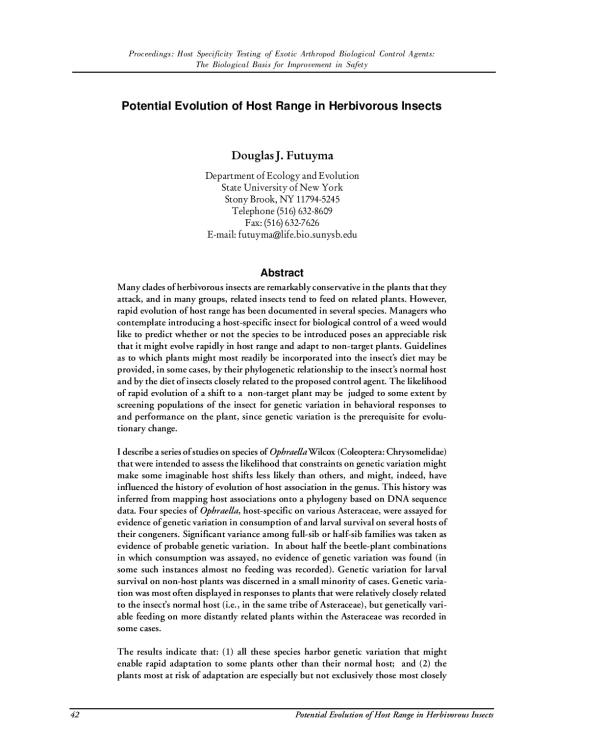Éditeur
USDA Forest Service Bulletin: 42-53, Forest Health Technology Enterprise Team
Department of Ecology and Evolution State University of New York
Année de publication:
2000
Lieu de publication
West Virginia, USA
Description physique:
12 o
Numéro d'appel
[EL]
Pays concernés
Pacific Region
Type de contenu
Langue
English
Identifiant de dossier:
975Disponible en ligne
Rubrique(s) thématique(s)
Potential Evolution of Host Range in Herbivorous Insects
Host-specificity Testing of Exotic Arthropod Biological Control Agents
The Biological Basis for Improvement in Safety
Résumé
Many clades of herbivorous insects are remarkably conservative in the plants that they attack, and in many groups, related insects tend to feed on related plants. However, rapid evolution of host range has been documented in several species. Managers who contemplate introducing a host-specific insect for biological control of a weed would like to predict whether or not the species to be introduced poses an appreciable risk that it might evolve rapidly in host range and adapt to non-target plants. Guidelines as to which plants might most readily be incorporated into the insect’s diet may be provided, in some cases, by their phylogenetic relationship to the insect’s normal host and by the diet of insects closely related to the proposed control agent. The likelihood of rapid evolution of a shift to a non-target plant may be judged to some extent by screening populations of the insect for genetic variation in behavioral responses to and performance on the plant, since genetic variation is the prerequisite for evolutionary change. I describe a series of studies on species of Ophraella Wilcox (Coleoptera: Chrysomelidae) that were intended to assess the likelihood that constraints on genetic variation might make some imaginable host shifts less likely than others, and might, indeed, have influenced the history of evolution of host association in the genus. This history was inferred from mapping host associations onto a phylogeny based on DNA sequence data. Four species of Ophraella, host-specific on various Asteraceae, were assayed for evidence of genetic variation in consumption of and larval survival on several hosts of their congeners. Significant variance among full-sib or half-sib families was taken as evidence of probable genetic variation. In about half the beetle-plant combinations in which consumption was assayed, no evidence of genetic variation was found (in some such instances almost no feeding was recorded). Genetic variation for larval survival on non-host plants was discerned in a small minority of cases. Genetic variation was most often displayed in responses to plants that were relatively closely related to the insect’s normal host (i.e., in the same tribe of Asteraceae), but genetically variable feeding on more distantly related plants within the Asteraceae was recorded in some cases. The results indicate that: (1) all these species harbor genetic variation that might enable rapid adaptation to some plants other than their normal host; and (2) the plants most at risk of adaptation are especially but not exclusively those most closely related to the insect’s normal host. Although this study provides evidence that paucity of genetic variation in responses to novel plants could constrain or influence the direction of the evolution of insect diet, the methods used in this study are inadequate to reveal rare alleles that might enable rapid response to natural selection for expansion of diet. In order to judge the likelihood that a proposed weed control agent might adapt to a non-target plant, large samples of insects should be screened, ideally by selection experiments.
Projet(s) associé(s):
Programme(s):
Éditeur
USDA Forest Service Bulletin: 42-53, Forest Health Technology Enterprise Team
Department of Ecology and Evolution State University of New York
Année de publication:
2000
Lieu de publication
West Virginia, USA
Description physique:
12 o
Numéro d'appel
[EL]
Pays concernés
Pacific Region
Type de contenu
Langue
English
Identifiant de dossier:
975 Dossier créé: 03-Mar-2022
Dossier modifié: 03-Mar-2022

